- Home
- Carolyn Keene
010 Buried Secrets Page 8
010 Buried Secrets Read online
Page 8
All right, admit it, she told herself as she headed home, you’re jealous. Brenda found Neil Gray and you didn’t. She beat you on that one, and you don’t like it one bit.
But had Brenda beaten Nancy on the really important one? Had Neil Gray killed John Harrington?
He hated the Harringtons, Nancy thought; he hadn’t bothered to keep that a secret. And he’d admitted shooting at Todd, which hardly helped his case any. Somehow, though, Nancy had trouble believing that a man who was so honest about the way he felt would bother hiding what he’d done—even if what he’d done was murder. Neil Gray was so down on the Harringtons that he probably would have bragged about killing one of them. And it wasn’t just jealousy that made her want to solve this case. It was not knowing what had happened that was driving her crazy.
By the time Nancy got home, the morning sun had been covered by a blanket of gray clouds, and a light rain was falling. After she let herself in through the back door of the house, she grabbed an apple from the kitchen table and headed for her room. The phone rang and she stopped to pick it up in the den.
“Hi,” Ned said.
Nancy’s mood suddenly turned gray, too. Was Ned going to tell her everything was over between them? That was all she needed. “Hi,” she answered. She almost wished she’d missed his call.
“How’s everything?” he asked. “The house back together again?”
“Just about.” The connection was still lousy, and Nancy reminded herself to complain to the phone company. Then, hoping to keep Ned from saying whatever he wanted to say, she started talking fast, telling him about Brenda and Neil Gray and the stone that had just missed crushing her skull.
“This is getting serious,” Ned said.
“Everyone keeps telling me that, and I’m beginning to believe it.”
“It’s true,” Ned told her. “Listen, Nancy, about last night. I wanted to—”
“You know what I think I’m going to do?” Nancy said, interrupting. “I think I’ll go back to Harrington House. There’s something I want to check out, and Todd’s going to be back soon, so I might not have another chance.” Anything, she thought. Anything to keep Ned from giving her bad news.
“Okay,” Ned said doubtfully. “But be careful, Nancy. I mean it. You don’t know what’s going on, and you could get hurt.”
“You’re right,” Nancy agreed. At least he still cares about whether or not I get hurt, she thought. “But don’t worry. I’ll be careful.”
“Call me when you get back,” Ned suggested. “I’d like to know what you find out, and besides, I really want to talk to you.”
Nancy wasn’t so sure she really wanted to talk to him, but she agreed to call when she got back. Still eating the apple, she went back to the kitchen, grabbed a couple of slices of ham from the refrigerator, got back in the Mustang, and headed for Harrington House. She’d used it as an excuse to put Ned off, and she still wasn’t sure what she was looking for, but anything was better than sitting at home.
After she parked in the narrow turnaround, Nancy got out and followed the wall to the broken spot. As soon as she touched down on the other side, the dogs came tearing toward her. But this time she was prepared. “Here, you moochers,” she called, tossing the ham at them. Satisfied, the dogs ignored her as she sprinted toward the mansion.
Nancy decided to try to sneak past Barry. If she didn’t, she’d wind up stuffing a thousand envelopes, and she definitely was not in the mood for that.
The front door was unlocked. Nancy let herself in, then tiptoed past the campaign rooms and up the circular staircase.
The minute Nancy entered John Harrington’s office, she knew what she wanted to see: that tape recorder, hidden behind the canvas panel. Had Todd’s father been a music freak? And if so, where were his tapes?
Nancy tried to lock the office door, but the lock didn’t work. The best she could do was shut it tightly. She located the canvas panel and managed to scrape a corner of it loose. Then, using her fingernails, she ripped and tugged until the canvas pulled free, showering the dusty Oriental carpet with chips and slivers of paint.
A tape was still on one of the reels, its loose end dangling free. Hoping that it wouldn’t fall apart in her hands, Nancy carefully fed it onto the other reel. Then, crossing her fingers that it still worked, she checked to see that it was plugged in and then pushed the power button. A small red light came on. Nancy pushed Rewind. As if it had been waiting for someone to put it into action, the machine clicked and whirred, the tape rolling smoothly from one reel to the other.
When the tape was rewound, Nancy pushed Play and stood back to listen.
“But, John,” a man said in a shaken voice, “I don’t understand!”
“Oh, I think you do,” another man said. His voice was smooth and steady, the voice of a man completely in charge. “You came to me and asked to be part of my staff. No one else would hire you because of your reputation, but I said yes even though you were suspected of buying votes in the last election.”
“But I told you I wouldn’t do it anymore. And now you’re asking me to break the law again? You want me to go out and buy votes for you.”
“No. I’m not asking you,” the second voice said. “I’m telling you. Because if you don’t, I’ll see to it that you are prosecuted for your mistakes, and you’ll never work in this state again!”
Silence followed. Nancy listened to the soft hiss of the tape and shook her head in disbelief. Whether Neil Gray had killed Harrington or not, she thought, he was right about him—John Harrington was not one of the good guys. What she had just heard was blackmail. She tensed as another voice came through the speakers. Was she going to hear more of the same?
It was just some quiet chatter between John Harrington and a speech writer. Then another period of silence, followed by a ringing telephone. John Harrington murmured softly and listened a lot, and Nancy had no idea what the conversation was about.
Finally someone else joined him, and as Nancy listened, she realized it was Charles Ogden, the chauffeur.
“Yes, Charles?” Harrington snapped.
“Sorry to disturb you, sir,” Ogden said. “I wanted to let you know that I had those repairs taken care of. The limousine is in tip-top shape now.”
“Let’s hope so.” A short pause. “Well?”
Charles Ogden cleared his throat. “Sir, I realize you’re busy, but I need to speak to you about something personal.”
Harrington sighed. “All right. What is it?”
“It’s about my raise, sir,” Ogden said. “I’ve been here a year now.”
“A year? That long?”
“Yes, and you told me that, uh, after a year I’d probably get a raise.”
“Hmm.” There was a creak. Harrington probably leaned back in his chair, Nancy thought. “Yes, I remember saying that,” he agreed. “But I also said that you’d probably get a raise if your work was satisfactory.”
“Yes, you did,” Ogden said.
“Sorry, Charles,” Harrington said, not sounding sorry at all. “No raise.”
“But, sir!”
“You don’t really expect one, do you? After all that has happened—cars breaking down, not ready on time, picking me up late—”
“But that one time I was late there was a traffic accident! I had to wait!”
“You should have left earlier,” Harrington told him. His voice was cold now, the way it had been with the unlucky vote-buyer. “And just yesterday, you got a flat tire and I was twenty minutes late for a speech.”
“Sir, cars do break down!” Charles Ogden sounded desperate now, and Nancy couldn’t blame him. “None of the breakdowns have been my fault. You have to realize that!”
“I don’t have to realize anything,” Harrington said. “I think that’s enough, Charles. It’s late, and I’ve got work to do.”
Nancy heard the slam of a door. Charles Ogden must have left without another word. Nancy was picturing him storming over to Hannah’s, humiliated an
d angry, when suddenly it hit her. This conversation had been recorded on the day John Harrington died! She was actually listening to the man talk only a few hours before his death. And if she kept listening, she just might hear something that would unlock this whole mystery!
Impatiently pacing the office floor, Nancy waited for what seemed like forever. First Harrington’s speech writer again, and a long conversation about what the main points of the speech were to be and where the jokes were to be inserted. The speech, Nancy noticed, made Harrington sound as though he cared more about the state and its people than anybody else in the world. That’s the joke, she thought.
There wasn’t a lot of tape left. As Nancy watched the rain come down outside, she wondered if the tape was going to be another dead end.
Finally, after a few more telephone calls, Nancy heard someone else come into the office. “I’m glad you’re here,” John Harrington said. “Because we have to have a talk, Sam.”
Sam? He must be talking to Sam Abbott, once Harrington’s personal secretary and now the mayor of River Heights!
Chapter
Fourteen
I’VE GOT THOSE reports you wanted,” a younger-voiced Abbott said. “It’s late, but I’ll be glad to go over them with you now.”
“Forget the reports for the moment,” Harrington said. “Have a seat, Sam. We’ve both been so busy we haven’t had a chance to talk lately.”
Nancy heard another creak and figured that Abbott had sat down. “I have to admit, I’ll be glad when the campaign’s over,” the future mayor said. “We could all use a couple weeks rest.”
“Where are you planning to go?” Harrington asked.
Abbott chuckled. “I haven’t had time to think about it. Some friends have a house in the country—maybe I’ll go there.”
“Sounds nice,” Harrington agreed. “But I’m surprised you don’t just get yourself your own place. Or maybe do some traveling—Hawaii would be good this time of year, or the Caribbean.”
“They’d be great,” Abbott said, laughing. “But I’m afraid my wallet isn’t fat enough for an island vacation.”
“It’s not?” Harrington sounded surprised. “I was sure you were carrying two wallets these days. One with your money in it, and the other filled with mine.”
For a moment, neither man spoke. John Harrington had just accused Abbott of stealing from him, and Nancy held her breath, wondering what Abbott’s answer would be.
Finally Abbott said, “Why do you say that?”
“I’ve watched you carefully, Sam,” Harrington told him. “You’re ambitious. You want power. The same kind of power I’ll have as soon as I win the election.”
“You haven’t answered my question,” Abbott reminded him. “Why do you think I’ve got a wallet stuffed with your money?”
“A conversation I overheard,” Harrington answered. “Several conversations, as a matter of fact. I won’t go into them all because they’re all pretty much the same. In one you were talking to a stockbroker, and you were telling him where to invest the money you’d just ‘inherited.’” Harrington laughed softly. “Now, I happen to know you never inherited any money, so I wondered where it came from. That’s when I checked the books—my campaign fund books. You did a good job of covering up all the funds you embezzled,” he said. “In fact, I doubt if anyone else could have spotted it.”
“Then it can’t be proven,” Abbott said calmly.
“But you forgot—I overheard your conversations, Sam,” Harrington said. “I have typed copies of them right here in the desk. You shouldn’t have used this phone, you know. That was your biggest mistake.”
Abbott still sounded calm. “This phone isn’t tapped,” he said. “You know it and I know it. You’re bluffing.”
“You’re right about the phone not being tapped,” Harrington agreed. “But listen to this.” There was the sound of a drawer opening, and then he began reading. After listening for a minute, Nancy knew he wasn’t bluffing.
Sam Abbott knew it, too. No longer calm, his voice was tight and angry. “Where did you… how… ? What did you do, hide behind the bookcase and write down everything I said?”
No, Nancy thought. He had his hidden tape recorder going.
“Does it really matter?” Harrington asked. “The point is, I know what you’ve been up to. Now, I suppose you want to know what I’m going to do about it.”
Abbott didn’t say anything.
“I’m not going to fire you,” Harrington said. “And I’m not going to turn you in. Of course, I do expect you to give the money back.”
“That’s all?” Abbott asked sarcastically.
“That’s all,” Harrington said. “Except that you’ll never work for anyone but me, of course. And you’ll never be free to be a political force on your own.” He laughed again, a harsh, grating laugh. “From now on, you’ll do exactly as I say.”
“You can’t do this!” Abbott cried angrily. “If you think I’m going to be your slave for the rest of my life, you’re wrong!”
“Oh? What choice do you have?” Harrington asked. “Come on, Sam, you don’t have any choice and you know it. You work for me, and you’re always going to work for me.”
Harrington laughed again. Then there was a cry, a shout, and a crash. Frozen, Nancy listened to the sound of papers being ripped—and then the tape ran out, stopping with a click that made her jump.
Slowly Nancy went to the tape recorder and took off the reel of tape. Her hands were shaking. She had just heard Sam Abbott hit John Harrington, and even though she hadn’t heard the rest, she could imagine what had happened. Abbott must have found every piece of evidence about himself in the desk, destroyed them all, and then thrown Harrington’s body out the window.
But he didn’t destroy all the evidence, Nancy thought, holding the tape. Because he didn’t know about the most incriminating piece. Only John Harrington knew about his secret taping system, and if she hadn’t stuck her head into that dumbwaiter shaft, she might never have found it, either.
Still stunned by what she’d heard, Nancy began searching through the desk drawers until she found an old manila envelope. Carefully she slipped the tape inside. You can’t let anything happen to this, she told herself. It’s the only proof you’ve got.
Nancy sealed the envelope and moved from behind the desk, planning to go downstairs to use one of Barry’s phones to call the police. As she passed one window, she stopped for a minute and rested her hands on the windowsill, thinking and staring blankly past the sheets of water.
It was raining harder now. The wind was ripping leaves from the trees and splattering them against the pane. As she leaned forward, she looked far to her left and saw through the driving rain a black car pull up and stop beside the house.
It has to be the same one, she thought. But no one followed me here, so how did anyone know where I was? Was it just a lucky guess? No! Suddenly Nancy knew what had happened. No one had followed her there, and no one had followed her that morning when she went to meet Brenda. They don’t need to follow me anymore, she thought. Because they tapped my phone! That’s what that break-in was all about. It wasn’t to scare me, it was to find out what I knew. They didn’t take anything from my house—they added something. Bugs for the phones.
And Nancy knew then who’d ordered the break-in and the tap, too. Mayor Abbott. From the minute she’d started on this case, he’d been one step ahead of her, watching and waiting to see if she’d discover anything. Remembering the tall, skinny man she’d seen in his office the day she made her appointment, Nancy realized that he was the same guy who had held the shotgun on her and had tried to scare her off and kill her. And now the mayor had sent him after her again.
But he’s out of luck, Nancy thought, heading for the door. He hasn’t scared me off yet, and I’m not about to be killed. Not when I’ve got the evidence in my hands.
Nancy opened the door and raced for the circular staircase. She’d go down one floor, she thought, find a room, an
d hide in it until the mayor’s lackey was gone. Then she’d get out of Harrington House and to the police as fast as she could.
Halfway down the spiral stairs, Nancy heard footsteps rushing down the hallway on the floor below. Silently she bounded back up and ran into the tower office and shut the door.
The footsteps were on the spiral stairs leading to the tower office now, and as Nancy looked frantically around the office, she realized that there was no place to hide.
Chapter
Fifteen
THE ONLY THING to do, Nancy thought, is to stand behind the door and rush out when it’s opened. She flattened herself against the wall, her eyes still darting around the room. That was when she saw the button for the dumbwaiter.
In a second Nancy was across the room—jabbing at the button, listening to the footsteps on the stairs, and praying.
Outside the door, the footsteps slowed to a cautious walk. That was all the time Nancy needed. The dumbwaiter arrived, and she scrambled inside, jabbing the button just as the office door swung open.
As the dumbwaiter started to creak its way down, Nancy heard the office door slam. Quick footsteps moved straight for the exposed tape recorder. Soon Mayor Abbott would figure out exactly how John Harrington had discovered what he was up to. But that won’t help him any, Nancy thought, holding tightly to the crucial tape. He’ll never get his hands on this.
It was dark and stuffy inside the dumbwaiter, but even in there Nancy could hear the thunder outside. The storm was getting worse. Driving down the cliff road in the middle of an electrical storm was not going to be fun, but Nancy knew she’d have to do it—and she’d have to do it quickly.
Finally, with a jerk and a thump, the dumbwaiter landed and Nancy slid the panel open. She got out and found herself in the biggest kitchen she’d ever seen. Two massive stoves were against one wall, and two refrigerators loomed against another. In the middle of the black- and white-tiled floor was a big wooden counter with copper pots and pans hanging over it.

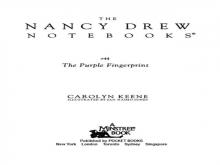 The Purple Fingerprint
The Purple Fingerprint The Picture of Guilt
The Picture of Guilt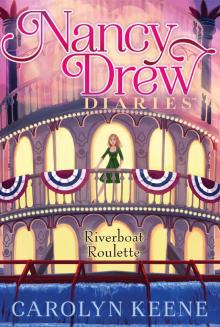 Riverboat Roulette
Riverboat Roulette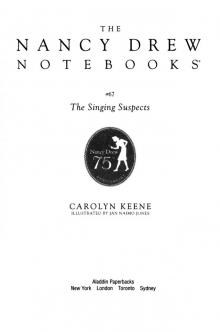 The Singing Suspects
The Singing Suspects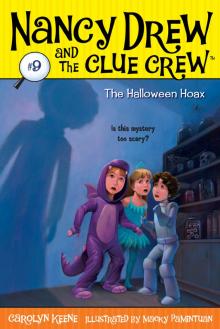 The Halloween Hoax
The Halloween Hoax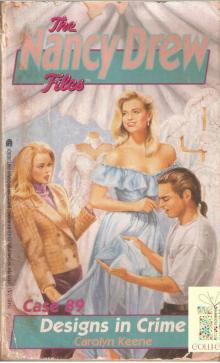 089 Designs in Crime
089 Designs in Crime The Hidden Treasures
The Hidden Treasures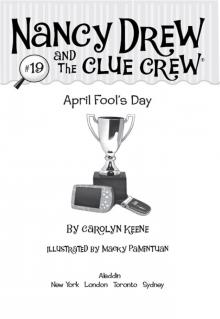 April Fool's Day
April Fool's Day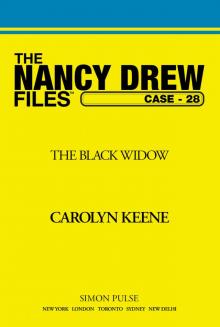 The Black Widow
The Black Widow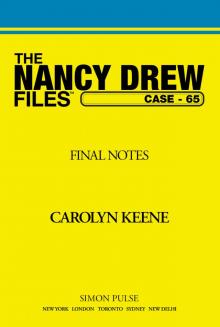 Final Notes
Final Notes The Haunting on Heliotrope Lane
The Haunting on Heliotrope Lane The Runaway Bride
The Runaway Bride The Ghost of Grey Fox Inn
The Ghost of Grey Fox Inn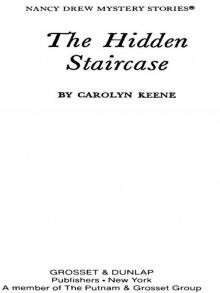 The Hidden Staircase
The Hidden Staircase Mystery of the Winged Lion
Mystery of the Winged Lion Over the Edge
Over the Edge The Circus Scare
The Circus Scare The Mystery of the Brass-Bound Trunk
The Mystery of the Brass-Bound Trunk Ski School Sneak
Ski School Sneak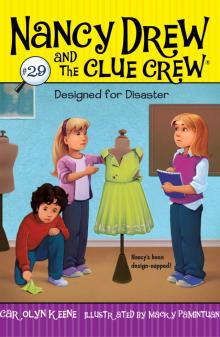 Designed for Disaster
Designed for Disaster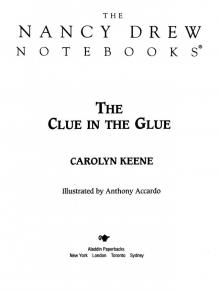 The Clue in the Glue
The Clue in the Glue Cold as Ice
Cold as Ice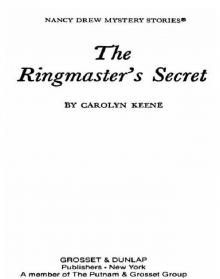 The Ringmaster's Secret
The Ringmaster's Secret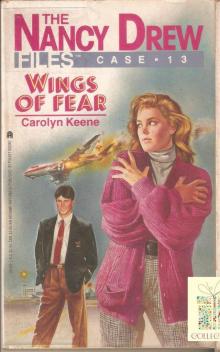 013 Wings of Fear
013 Wings of Fear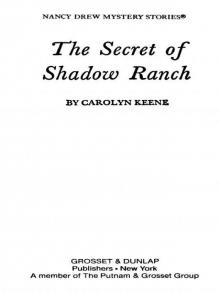 The Secret of Shadow Ranch
The Secret of Shadow Ranch Not Nice on Ice
Not Nice on Ice Earth Day Escapade
Earth Day Escapade Mystery of Crocodile Island
Mystery of Crocodile Island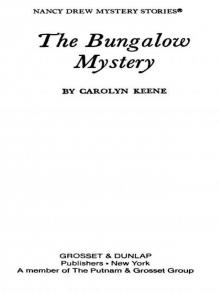 The Bungalow Mystery
The Bungalow Mystery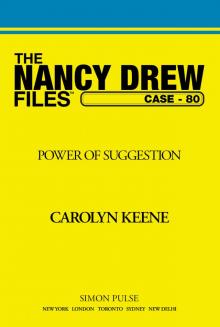 Power of Suggestion
Power of Suggestion The Lemonade Raid
The Lemonade Raid Model Crime
Model Crime The Lucky Horseshoes
The Lucky Horseshoes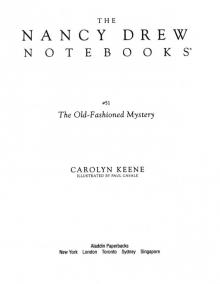 The Secret of the Old Clock
The Secret of the Old Clock The Clue at Black Creek Farm
The Clue at Black Creek Farm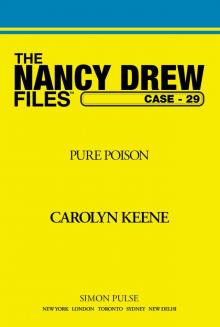 Pure Poison
Pure Poison Nobody's Business
Nobody's Business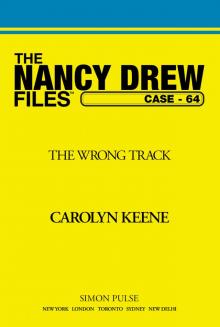 Wrong Track
Wrong Track Chick-Napped!
Chick-Napped!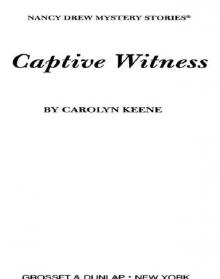 Captive Witness
Captive Witness If Looks Could Kill
If Looks Could Kill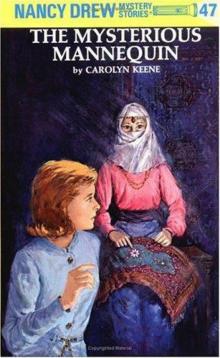 The Mysterious Mannequin
The Mysterious Mannequin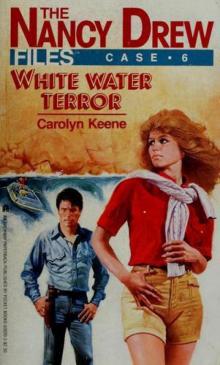 White Water Terror
White Water Terror Mystery of the Midnight Rider
Mystery of the Midnight Rider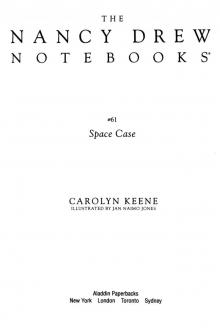 Space Case
Space Case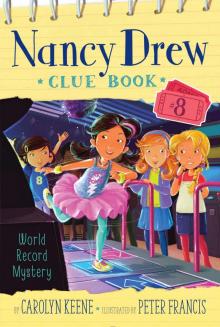 World Record Mystery
World Record Mystery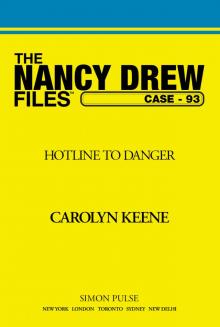 Hotline to Danger
Hotline to Danger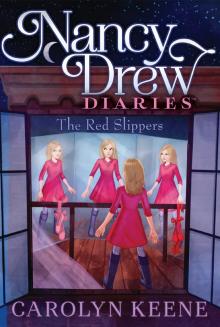 The Red Slippers
The Red Slippers A Crime for Christmas
A Crime for Christmas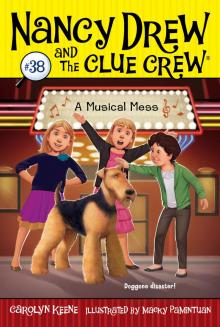 A Musical Mess
A Musical Mess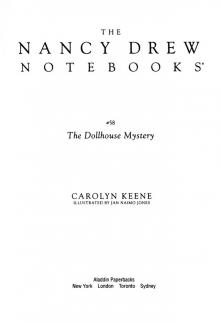 The Dollhouse Mystery
The Dollhouse Mystery Portrait in Crime
Portrait in Crime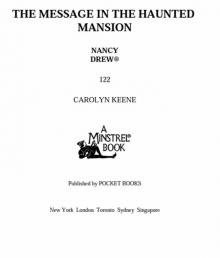 The Message in the Haunted Mansion
The Message in the Haunted Mansion Playing With Fire
Playing With Fire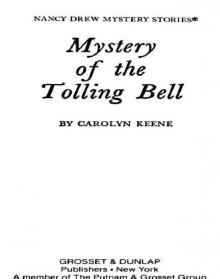 Mystery of the Tolling Bell
Mystery of the Tolling Bell Cutting Edge
Cutting Edge The Gumdrop Ghost
The Gumdrop Ghost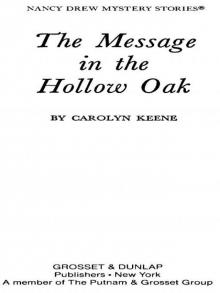 The Message in the Hollow Oak
The Message in the Hollow Oak Trial by Fire
Trial by Fire Mystery at Moorsea Manor
Mystery at Moorsea Manor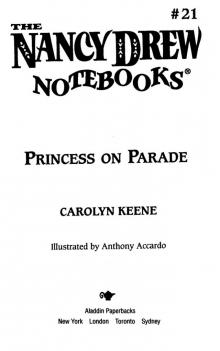 Princess on Parade
Princess on Parade The Flying Saucer Mystery
The Flying Saucer Mystery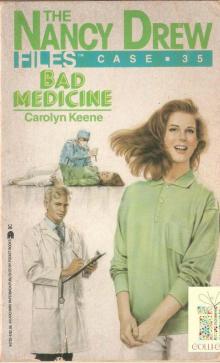 035 Bad Medicine
035 Bad Medicine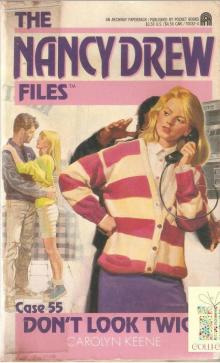 055 Don't Look Twice
055 Don't Look Twice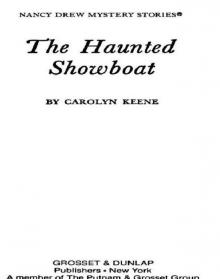 The Haunted Showboat
The Haunted Showboat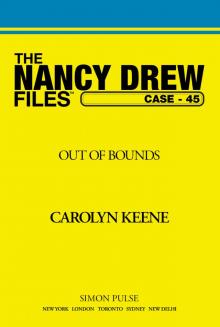 Out of Bounds
Out of Bounds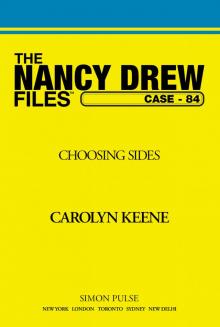 Choosing Sides
Choosing Sides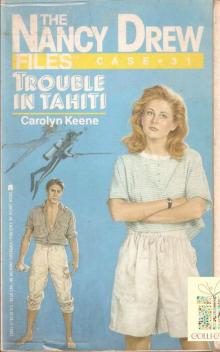 031 Trouble in Tahiti
031 Trouble in Tahiti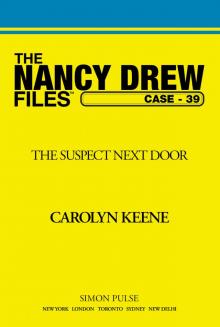 The Suspect Next Door
The Suspect Next Door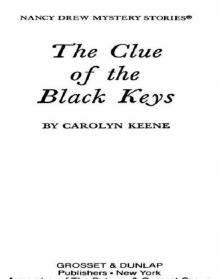 The Clue of the Black Keys
The Clue of the Black Keys The Secret Santa
The Secret Santa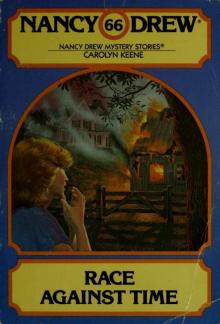 Race Against Time
Race Against Time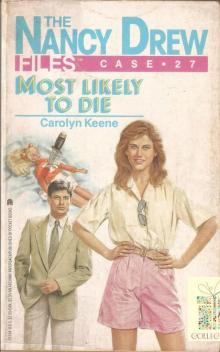 027 Most Likely to Die
027 Most Likely to Die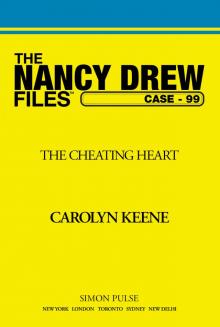 The Cheating Heart
The Cheating Heart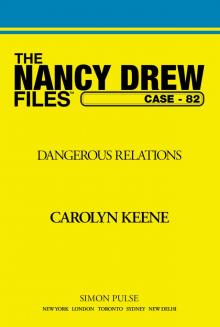 Dangerous Relations
Dangerous Relations It's No Joke!
It's No Joke! The Mystery of the Mother Wolf
The Mystery of the Mother Wolf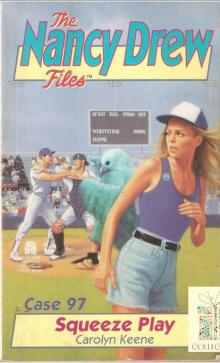 097 Squeeze Play
097 Squeeze Play Secret at Mystic Lake
Secret at Mystic Lake The Double Jinx Mystery
The Double Jinx Mystery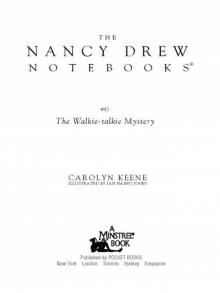 The Walkie Talkie Mystery
The Walkie Talkie Mystery The Case of the Vanishing Veil
The Case of the Vanishing Veil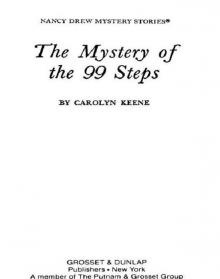 The Mystery of the 99 Steps
The Mystery of the 99 Steps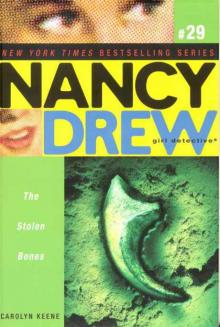 The Stolen Bones
The Stolen Bones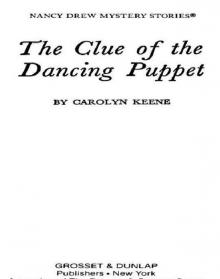 The Clue of the Dancing Puppet
The Clue of the Dancing Puppet The Sand Castle Mystery
The Sand Castle Mystery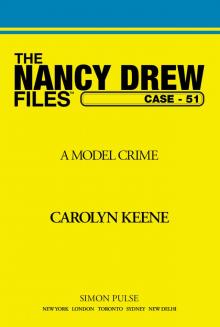 A Model Crime
A Model Crime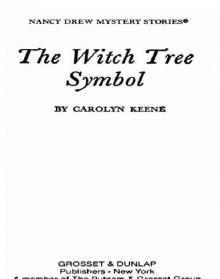 The Witch Tree Symbol
The Witch Tree Symbol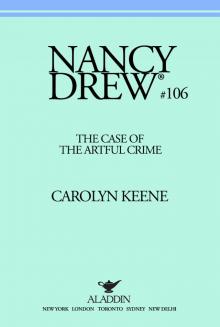 The Case of the Artful Crime
The Case of the Artful Crime Mall Madness
Mall Madness Swiss Secrets
Swiss Secrets The Magician's Secret
The Magician's Secret Tall, Dark and Deadly
Tall, Dark and Deadly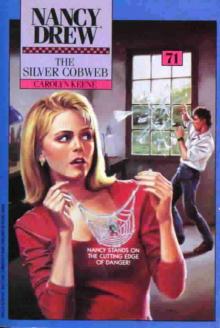 The Silver Cobweb
The Silver Cobweb The Clue of the Gold Doubloons
The Clue of the Gold Doubloons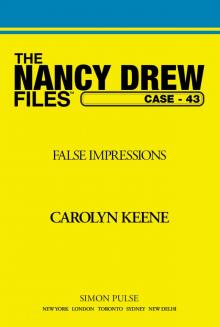 False Impressions
False Impressions Model Suspect
Model Suspect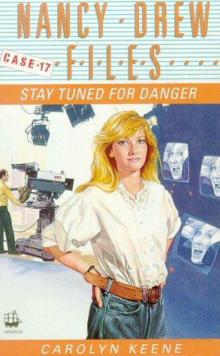 Stay Tuned for Danger
Stay Tuned for Danger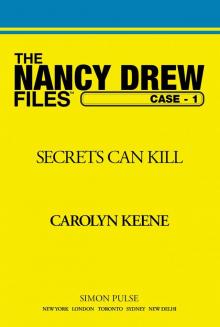 Secrets Can Kill
Secrets Can Kill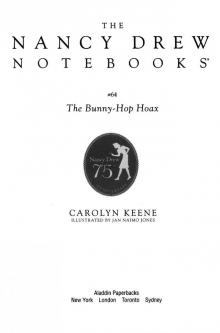 The Bunny-Hop Hoax
The Bunny-Hop Hoax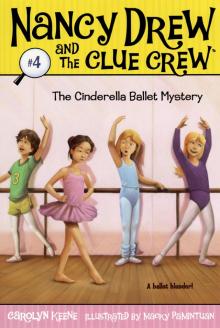 The Cinderella Ballet Mystery
The Cinderella Ballet Mystery The Secret at Solaire
The Secret at Solaire Trash or Treasure?
Trash or Treasure? The Missing Horse Mystery
The Missing Horse Mystery The Lost Locket
The Lost Locket The Secret of the Wooden Lady
The Secret of the Wooden Lady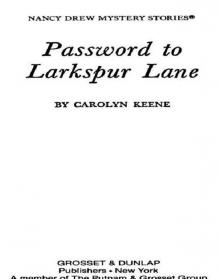 Password to Larkspur Lane
Password to Larkspur Lane Movie Madness
Movie Madness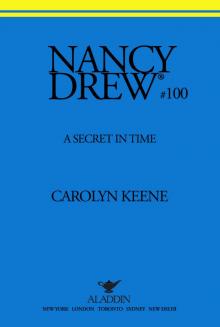 A Secret in Time
A Secret in Time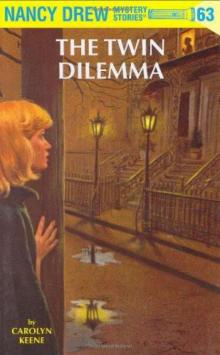 The Twin Dilemma
The Twin Dilemma Candy Is Dandy
Candy Is Dandy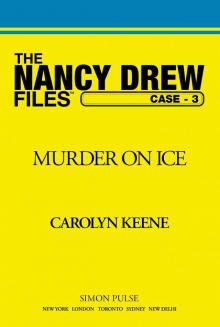 Murder on Ice
Murder on Ice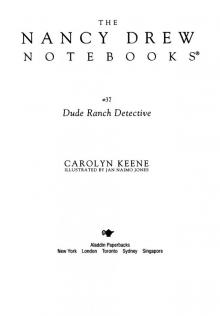 Dude Ranch Detective
Dude Ranch Detective The Slumber Party Secret
The Slumber Party Secret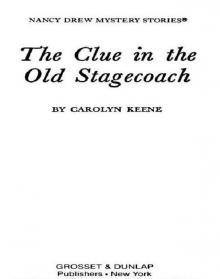 The Clue in the Old Stagecoach
The Clue in the Old Stagecoach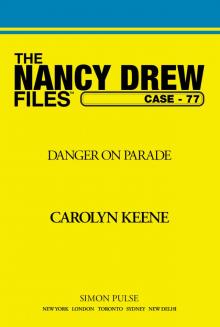 Danger on Parade
Danger on Parade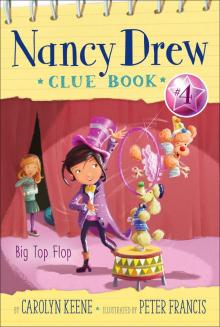 Big Top Flop
Big Top Flop Strangers on a Train
Strangers on a Train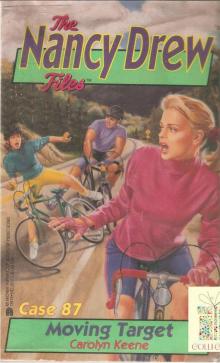 087 Moving Target
087 Moving Target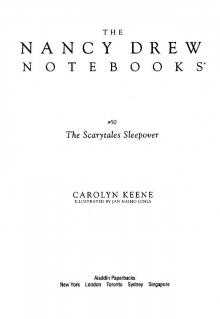 The Scarytales Sleepover
The Scarytales Sleepover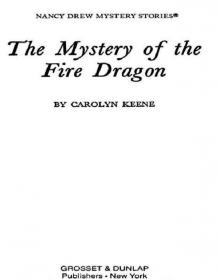 The Mystery of the Fire Dragon
The Mystery of the Fire Dragon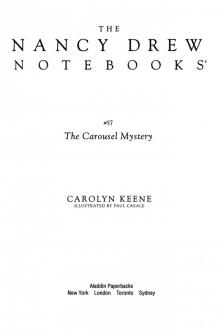 The Carousel Mystery
The Carousel Mystery The Eskimo's Secret
The Eskimo's Secret Thrill on the Hill
Thrill on the Hill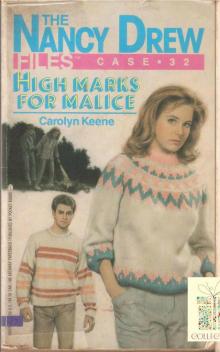 032 High Marks for Malice
032 High Marks for Malice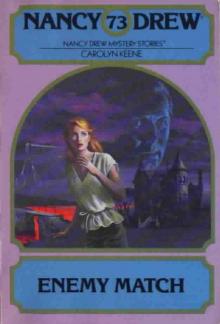 Enemy Match
Enemy Match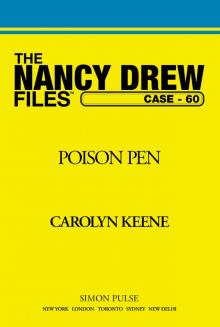 Poison Pen
Poison Pen Lights, Camera . . . Cats!
Lights, Camera . . . Cats! Lost in the Everglades
Lost in the Everglades Strike-Out Scare
Strike-Out Scare Third-Grade Reporter
Third-Grade Reporter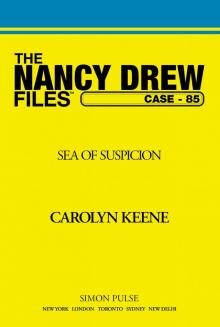 Sea of Suspicion
Sea of Suspicion Wedding Day Disaster
Wedding Day Disaster The Make-A-Pet Mystery
The Make-A-Pet Mystery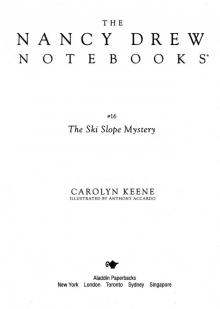 The Ski Slope Mystery
The Ski Slope Mystery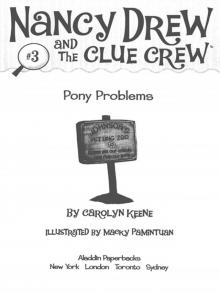 Pony Problems
Pony Problems Candy Kingdom Chaos
Candy Kingdom Chaos The Sign in the Smoke
The Sign in the Smoke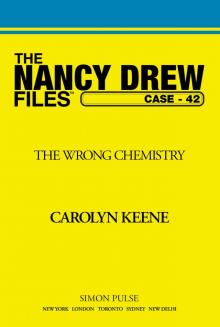 The Wrong Chemistry
The Wrong Chemistry Circus Act
Circus Act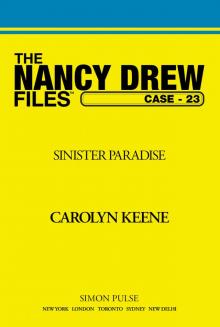 Sinister Paradise
Sinister Paradise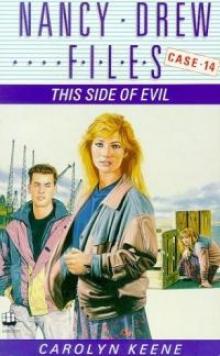 This Side of Evil
This Side of Evil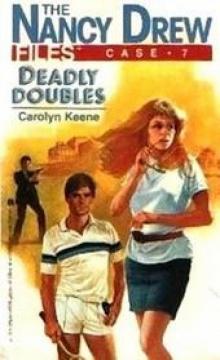 Deadly Doubles
Deadly Doubles The Mystery of the Masked Rider
The Mystery of the Masked Rider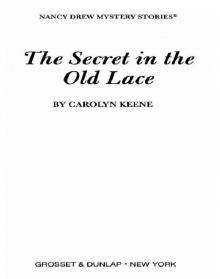 The Secret in the Old Lace
The Secret in the Old Lace The Pen Pal Puzzle
The Pen Pal Puzzle Without a Trace
Without a Trace Whose Pet Is Best?
Whose Pet Is Best?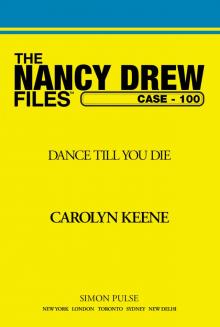 Dance Till You Die
Dance Till You Die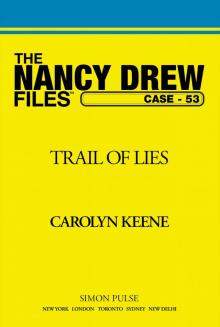 Trail of Lies
Trail of Lies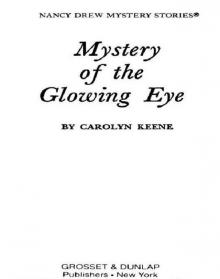 Mystery of the Glowing Eye
Mystery of the Glowing Eye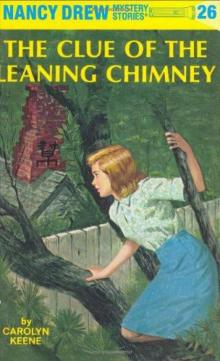 The Clue of the Leaning Chimney
The Clue of the Leaning Chimney The Crook Who Took the Book
The Crook Who Took the Book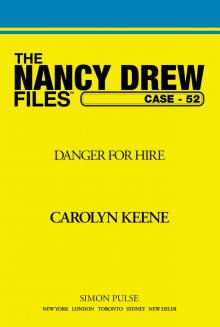 Danger for Hire
Danger for Hire Thanksgiving Thief
Thanksgiving Thief Intruder!
Intruder!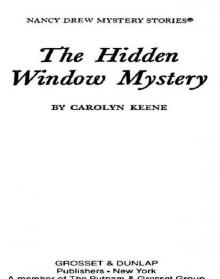 The Hidden Window Mystery
The Hidden Window Mystery Win, Place or Die
Win, Place or Die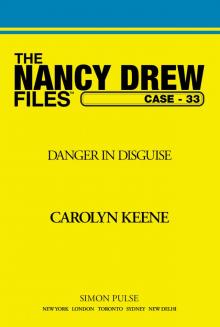 Danger in Disguise
Danger in Disguise The Best Detective
The Best Detective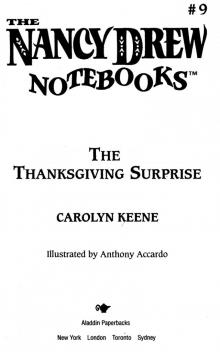 The Thanksgiving Surprise
The Thanksgiving Surprise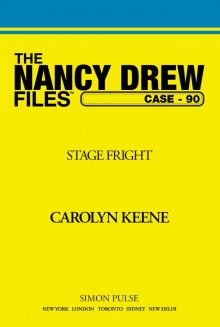 Stage Fright
Stage Fright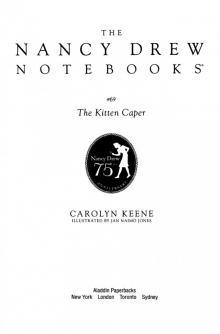 The Kitten Caper
The Kitten Caper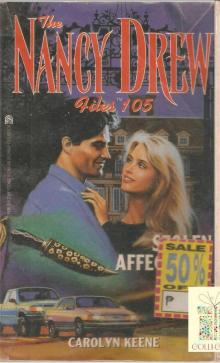 Stolen Affections
Stolen Affections The Phantom of Nantucket
The Phantom of Nantucket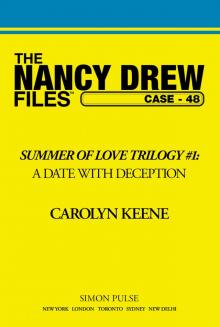 Date With Deception
Date With Deception Cooking Camp Disaster
Cooking Camp Disaster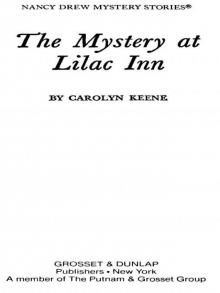 The Mystery at Lilac Inn
The Mystery at Lilac Inn Springtime Crime
Springtime Crime Action!
Action! Into Thin Air
Into Thin Air The Chocolate-Covered Contest
The Chocolate-Covered Contest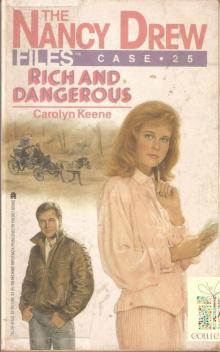 025 Rich and Dangerous
025 Rich and Dangerous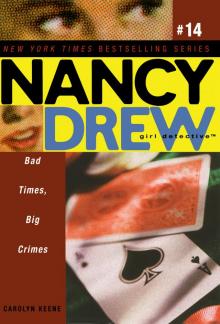 Bad Times, Big Crimes
Bad Times, Big Crimes 078 The Phantom Of Venice
078 The Phantom Of Venice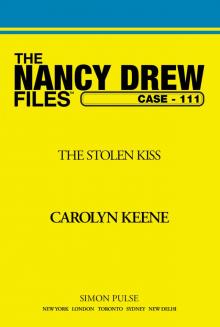 The Stolen Kiss
The Stolen Kiss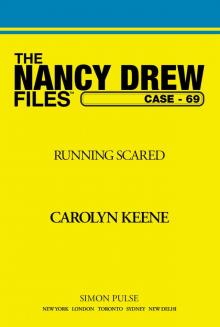 Running Scared
Running Scared The Wedding Gift Goof
The Wedding Gift Goof Time Thief
Time Thief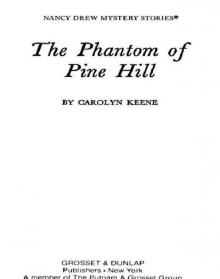 The Phantom of Pine Hill
The Phantom of Pine Hill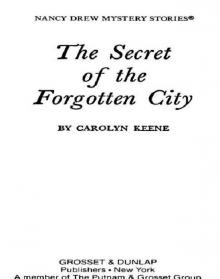 The Secret of the Forgotten City
The Secret of the Forgotten City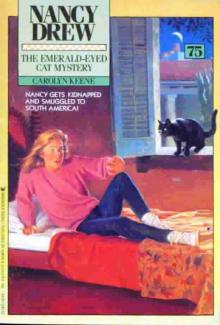 The Emerald-Eyed Cat Mystery
The Emerald-Eyed Cat Mystery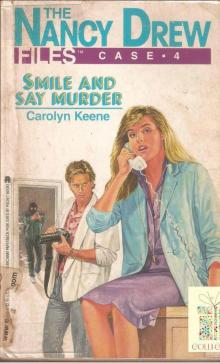 004 Smile and Say Murder
004 Smile and Say Murder Curse of the Arctic Star
Curse of the Arctic Star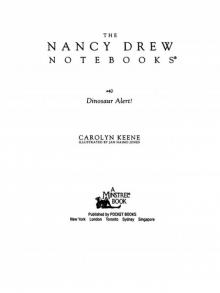 Dinosaur Alert!
Dinosaur Alert!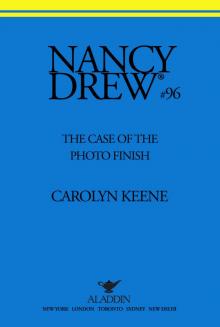 The Case of the Photo Finish
The Case of the Photo Finish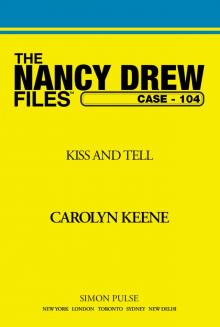 Kiss and Tell
Kiss and Tell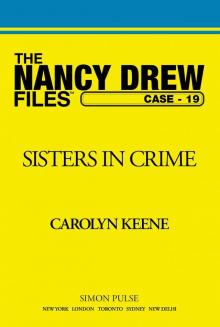 Sisters in Crime
Sisters in Crime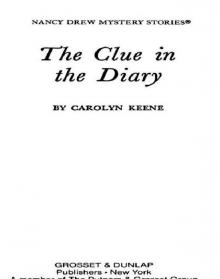 The Clue in the Diary
The Clue in the Diary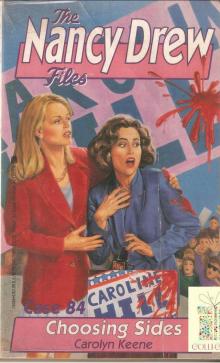 084 Choosing Sides
084 Choosing Sides Haunting of Horse Island
Haunting of Horse Island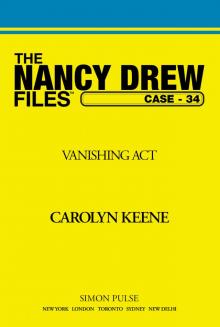 Vanishing Act
Vanishing Act The Big Island Burglary
The Big Island Burglary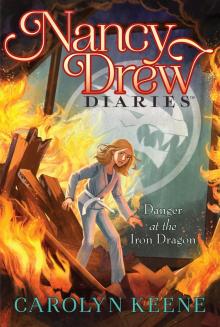 Danger at the Iron Dragon
Danger at the Iron Dragon Pets on Parade
Pets on Parade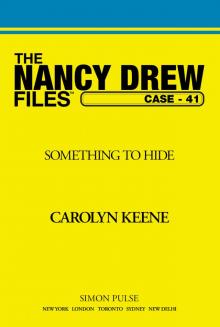 Something to Hide
Something to Hide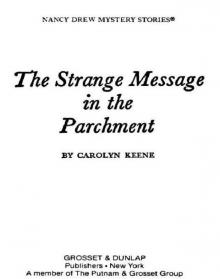 The Strange Message in the Parchment
The Strange Message in the Parchment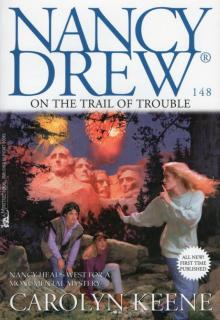 On the Trail of Trouble
On the Trail of Trouble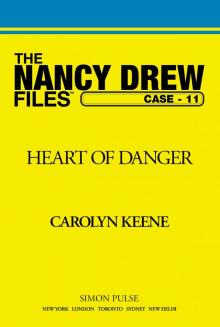 Heart of Danger
Heart of Danger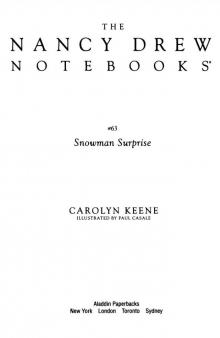 The Snowman Surprise
The Snowman Surprise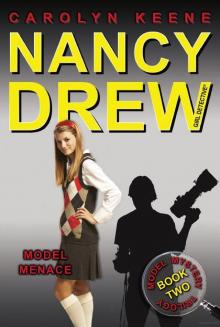 Model Menace
Model Menace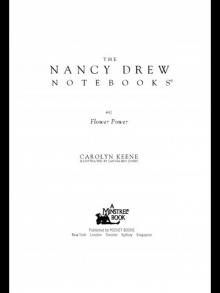 Flower Power
Flower Power The Great Goat Gaffe
The Great Goat Gaffe 081 Making Waves
081 Making Waves Famous Mistakes
Famous Mistakes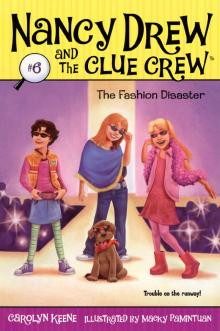 The Fashion Disaster
The Fashion Disaster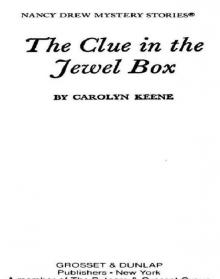 The Clue in the Jewel Box
The Clue in the Jewel Box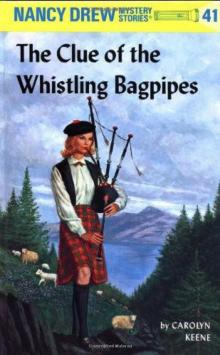 The Clue of the Whistling Bagpipes
The Clue of the Whistling Bagpipes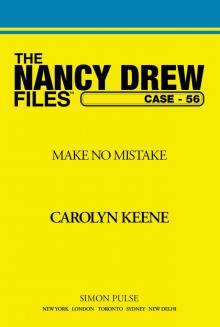 Make No Mistake
Make No Mistake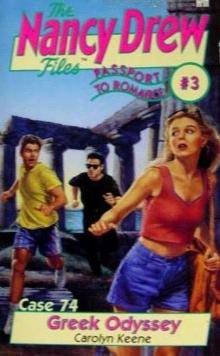 Greek Odyssey
Greek Odyssey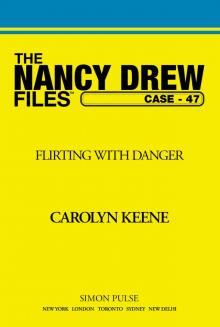 Flirting With Danger
Flirting With Danger Double Take
Double Take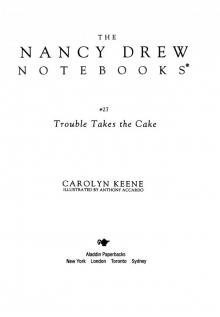 Trouble Takes the Cake
Trouble Takes the Cake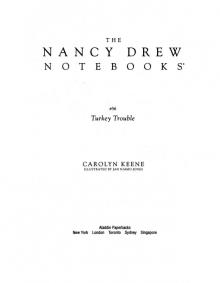 Turkey Trouble
Turkey Trouble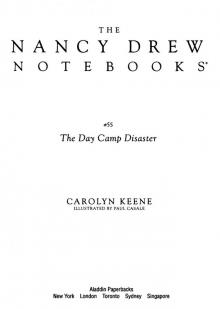 The Day Camp Disaster
The Day Camp Disaster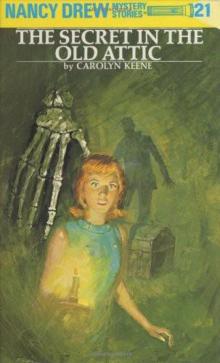 The Secret in the Old Attic
The Secret in the Old Attic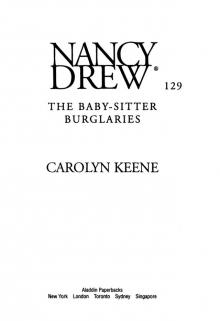 The Baby-Sitter Burglaries
The Baby-Sitter Burglaries Recipe for Murder
Recipe for Murder The Secret of the Scarecrow
The Secret of the Scarecrow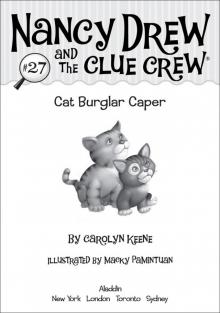 Cat Burglar Caper
Cat Burglar Caper Turkey Trot Plot
Turkey Trot Plot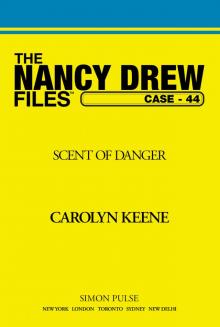 Scent of Danger
Scent of Danger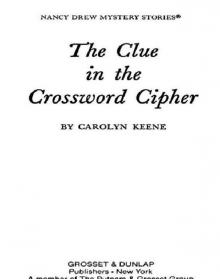 The Clue in the Crossword Cipher
The Clue in the Crossword Cipher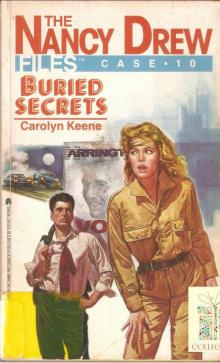 010 Buried Secrets
010 Buried Secrets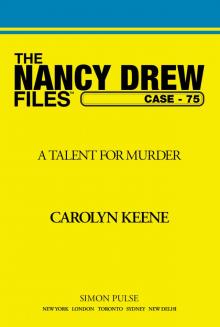 A Talent for Murder
A Talent for Murder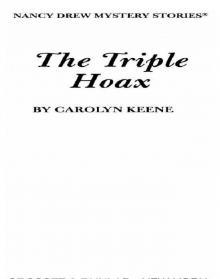 The Triple Hoax
The Triple Hoax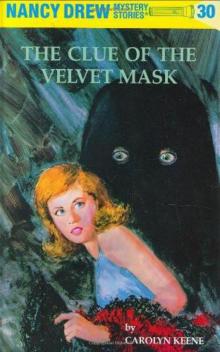 The Clue of the Velvet Mask
The Clue of the Velvet Mask Last Lemonade Standing
Last Lemonade Standing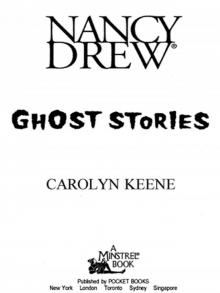 The Ghost of Blackwood Hall
The Ghost of Blackwood Hall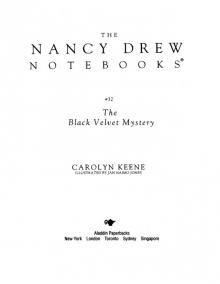 The Black Velvet Mystery
The Black Velvet Mystery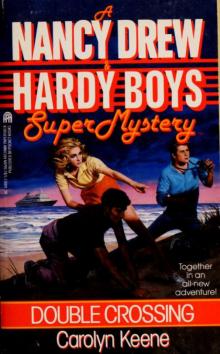 Double Crossing
Double Crossing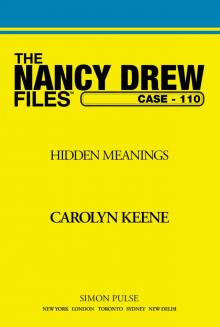 Hidden Meanings
Hidden Meanings Trouble at Camp Treehouse
Trouble at Camp Treehouse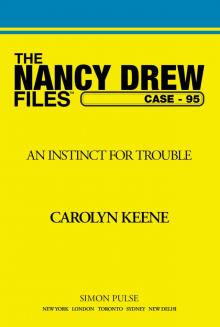 An Instinct for Trouble
An Instinct for Trouble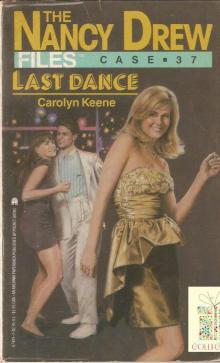 037 Last Dance
037 Last Dance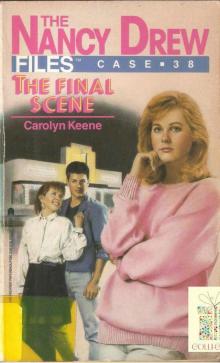 038 The Final Scene
038 The Final Scene Duck Derby Debacle
Duck Derby Debacle The Pumpkin Patch Puzzle
The Pumpkin Patch Puzzle Hidden Pictures
Hidden Pictures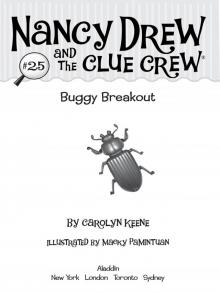 Buggy Breakout
Buggy Breakout California Schemin'
California Schemin'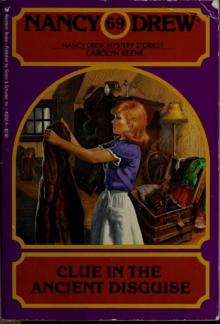 Clue in the Ancient Disguise
Clue in the Ancient Disguise Case of the Sneaky Snowman
Case of the Sneaky Snowman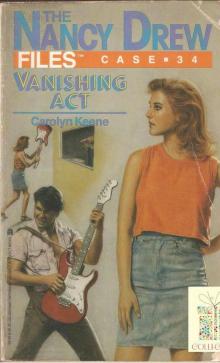 034 Vanishing Act
034 Vanishing Act A Script for Danger
A Script for Danger The Flower Show Fiasco
The Flower Show Fiasco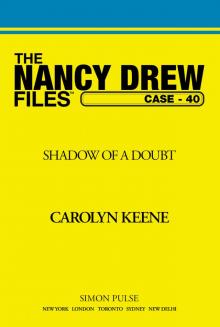 Shadow of a Doubt
Shadow of a Doubt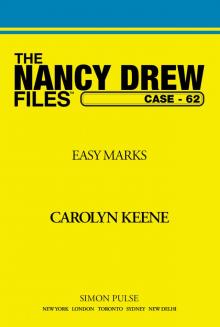 Easy Marks
Easy Marks Alien in the Classroom
Alien in the Classroom Ghost Stories, #2 (Nancy Drew)
Ghost Stories, #2 (Nancy Drew) The Bike Race Mystery
The Bike Race Mystery False Pretenses
False Pretenses The Kachina Doll Mystery
The Kachina Doll Mystery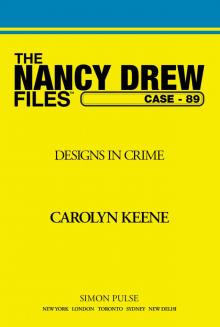 Designs in Crime
Designs in Crime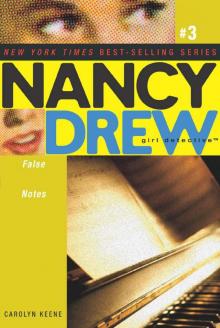 False Notes
False Notes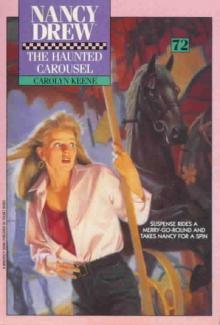 The Haunted Carousel
The Haunted Carousel Bad Day for Ballet
Bad Day for Ballet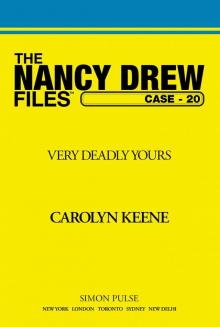 Very Deadly Yours
Very Deadly Yours The Fine-Feathered Mystery
The Fine-Feathered Mystery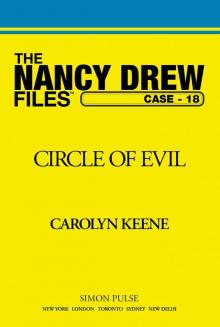 Circle of Evil
Circle of Evil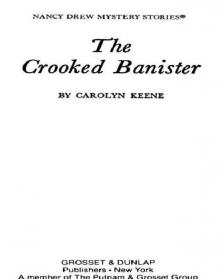 The Crooked Banister
The Crooked Banister 005 Hit and Run Holiday
005 Hit and Run Holiday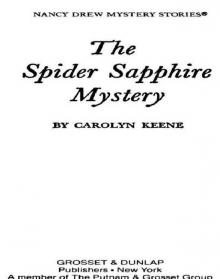 The Spider Sapphire Mystery
The Spider Sapphire Mystery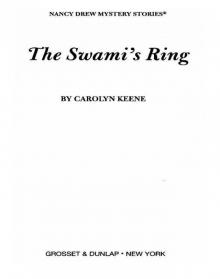 The Swami's Ring
The Swami's Ring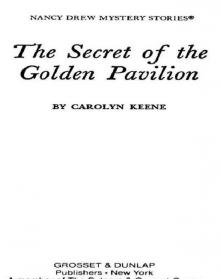 The Secret of the Golden Pavilion
The Secret of the Golden Pavilion Recipe for Trouble
Recipe for Trouble Betrayed by Love
Betrayed by Love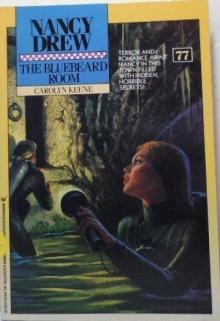 The Bluebeard Room
The Bluebeard Room Sweet Revenge
Sweet Revenge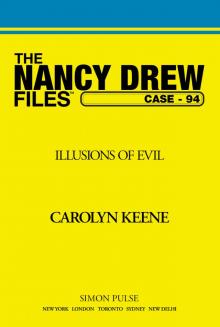 Illusions of Evil
Illusions of Evil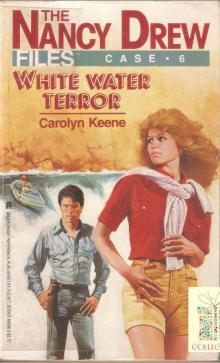 006 White Water Terror
006 White Water Terror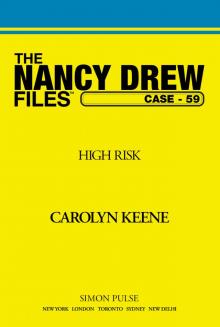 High Risk
High Risk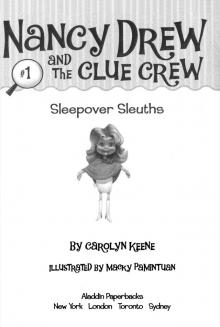 Sleepover Sleuths
Sleepover Sleuths The Clue on the Crystal Dove
The Clue on the Crystal Dove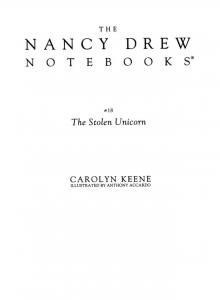 The Stolen Unicorn
The Stolen Unicorn The Professor and the Puzzle
The Professor and the Puzzle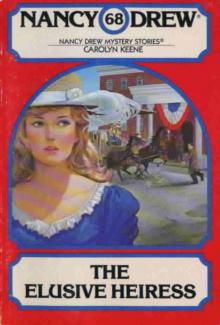 The Elusive Heiress
The Elusive Heiress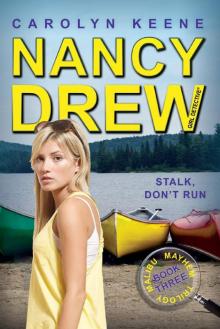 Stalk, Don't Run
Stalk, Don't Run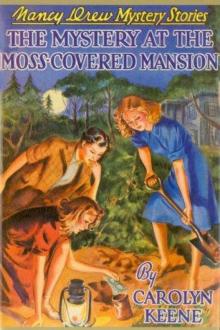 The Mystery at the Moss-Covered Mansion
The Mystery at the Moss-Covered Mansion The Tortoise and the Scare
The Tortoise and the Scare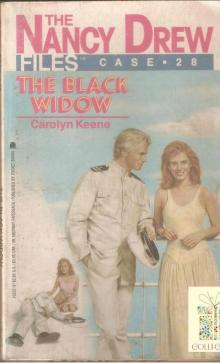 028 The Black Widow
028 The Black Widow Big Worry in Wonderland
Big Worry in Wonderland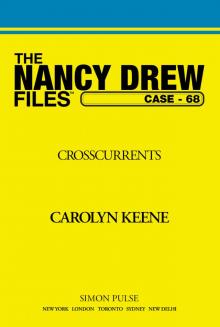 Crosscurrents
Crosscurrents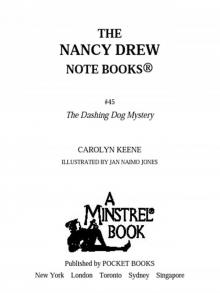 The Dashing Dog Mystery
The Dashing Dog Mystery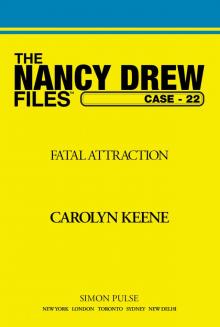 Fatal Attraction
Fatal Attraction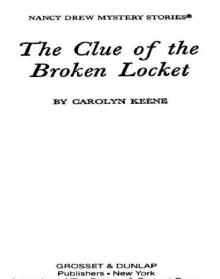 The Clue of the Broken Locket
The Clue of the Broken Locket The Stinky Cheese Surprise
The Stinky Cheese Surprise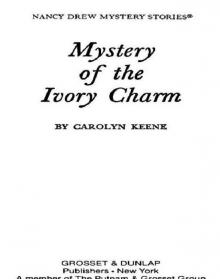 Mystery of the Ivory Charm
Mystery of the Ivory Charm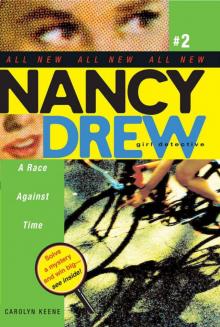 A Race Against Time
A Race Against Time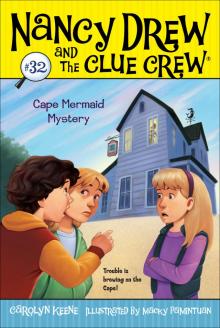 Cape Mermaid Mystery
Cape Mermaid Mystery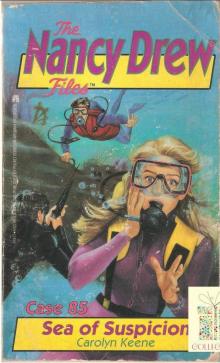 085 Sea of Suspicion
085 Sea of Suspicion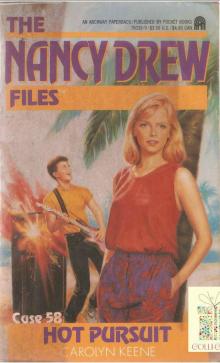 058 Hot Pursuit
058 Hot Pursuit The Secret in the Spooky Woods
The Secret in the Spooky Woods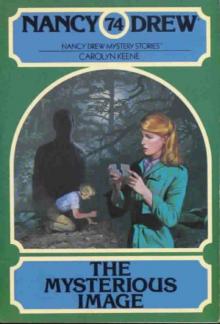 The Mysterious Image
The Mysterious Image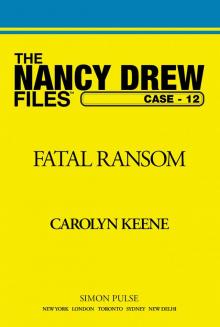 Fatal Ransom
Fatal Ransom The Stolen Show
The Stolen Show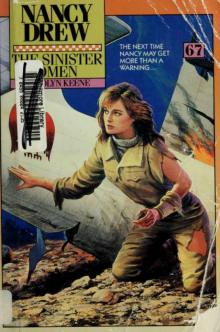 The Sinister Omen
The Sinister Omen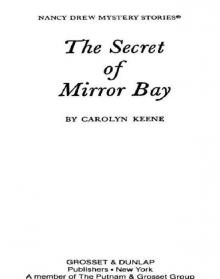 The Secret of Mirror Bay
The Secret of Mirror Bay Rendezvous in Rome
Rendezvous in Rome The Perfect Plot
The Perfect Plot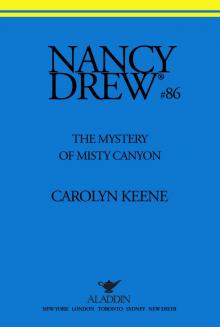 The Mystery of Misty Canyon
The Mystery of Misty Canyon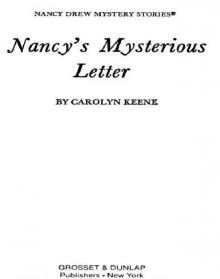 Nancy's Mysterious Letter
Nancy's Mysterious Letter The Snow Queen's Surprise
The Snow Queen's Surprise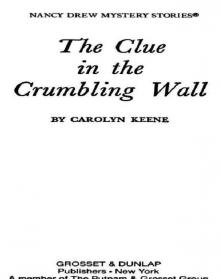 The Clue in the Crumbling Wall
The Clue in the Crumbling Wall Dare at the Fair
Dare at the Fair Scream for Ice Cream
Scream for Ice Cream A Star Witness
A Star Witness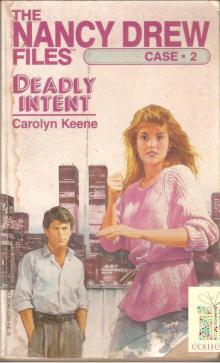 002 Deadly Intent
002 Deadly Intent Museum Mayhem
Museum Mayhem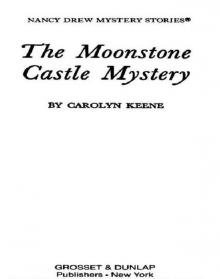 The Moonstone Castle Mystery
The Moonstone Castle Mystery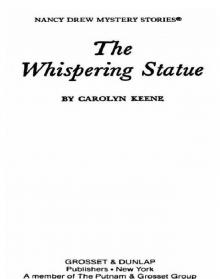 The Whispering Statue
The Whispering Statue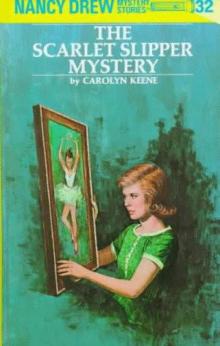 The Scarlet Slipper Mystery
The Scarlet Slipper Mystery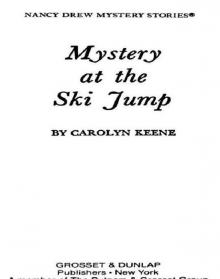 Mystery at the Ski Jump
Mystery at the Ski Jump Hot Pursuit
Hot Pursuit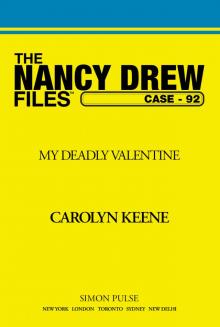 My Deadly Valentine
My Deadly Valentine The Silent Suspect
The Silent Suspect Deep Secrets
Deep Secrets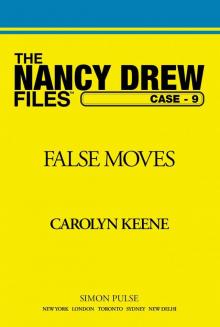 False Moves
False Moves The Zoo Crew
The Zoo Crew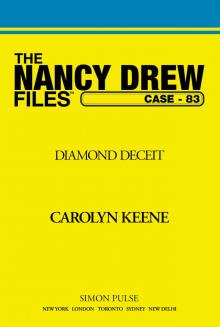 Diamond Deceit
Diamond Deceit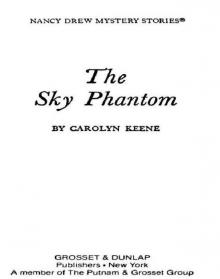 The Sky Phantom
The Sky Phantom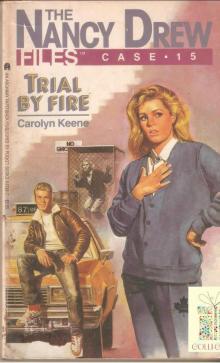 015 Trial by Fire
015 Trial by Fire The Quest of the Missing Map
The Quest of the Missing Map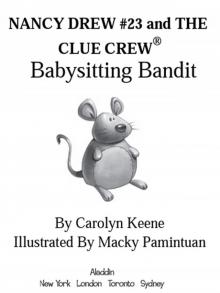 Babysitting Bandit
Babysitting Bandit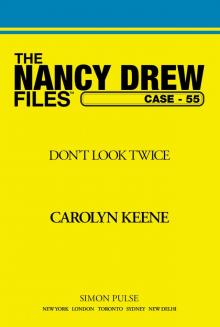 Don't Look Twice
Don't Look Twice Never Say Die
Never Say Die The Soccer Shoe Clue
The Soccer Shoe Clue Pool Party Puzzler
Pool Party Puzzler The Case of the Lost Song
The Case of the Lost Song The Apple Bandit
The Apple Bandit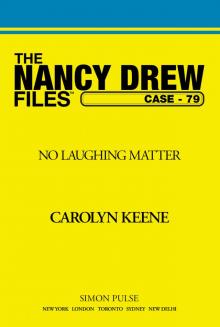 No Laughing Matter
No Laughing Matter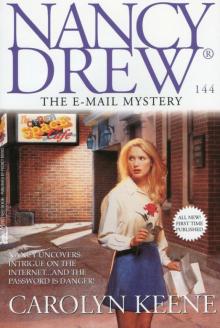 The Thirteenth Pearl
The Thirteenth Pearl Sabotage at Willow Woods
Sabotage at Willow Woods Butterfly Blues
Butterfly Blues Model Crime 1
Model Crime 1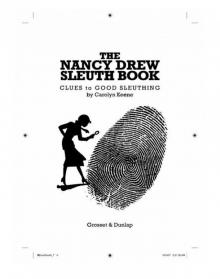 The Nancy Drew Sleuth Book
The Nancy Drew Sleuth Book Mystery by Moonlight
Mystery by Moonlight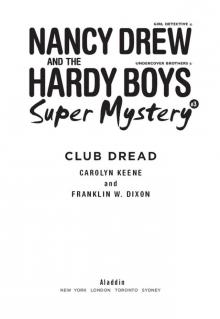 Club Dread
Club Dread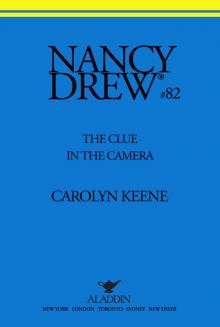 The Clue in the Camera
The Clue in the Camera 118 Betrayed By Love
118 Betrayed By Love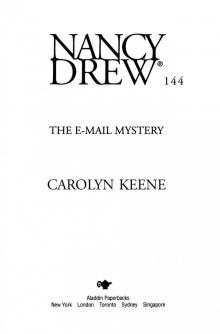 The E-Mail Mystery (Nancy Drew Book 144)
The E-Mail Mystery (Nancy Drew Book 144)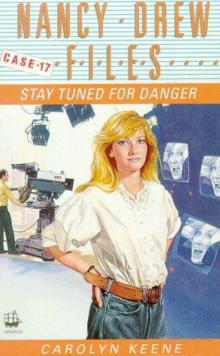 Stay Tuned for Danger: Circle of Evil
Stay Tuned for Danger: Circle of Evil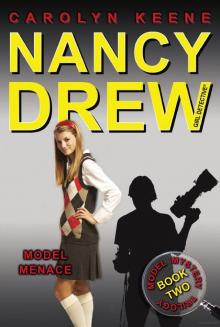 Model Menace 2
Model Menace 2 California Schemin': Book One in the Malibu Mayhem Trilogy
California Schemin': Book One in the Malibu Mayhem Trilogy Zoo Clue (Nancy Drew Notebooks)
Zoo Clue (Nancy Drew Notebooks)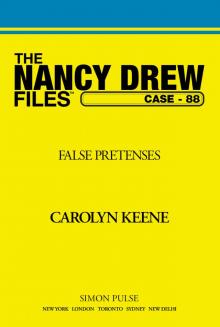 False Pretences
False Pretences 151 The Chocolate-Covered Contest
151 The Chocolate-Covered Contest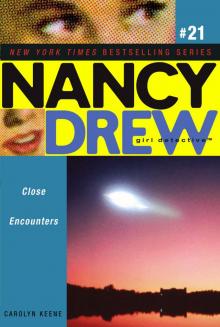 Close Encounters
Close Encounters The Emeral-Eyed Cat Mystery
The Emeral-Eyed Cat Mystery Boo Crew
Boo Crew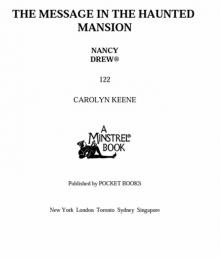 The Message in the Haunted Mansion (Nancy Drew Book 122)
The Message in the Haunted Mansion (Nancy Drew Book 122) A Nancy Drew Christmas
A Nancy Drew Christmas 149 The Clue Of The Gold Doubloons
149 The Clue Of The Gold Doubloons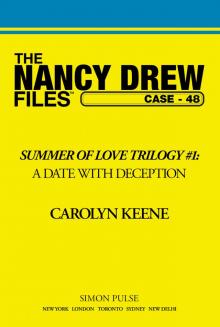 A Date with Deception
A Date with Deception 101 The Picture of Guilt
101 The Picture of Guilt The Secret in the Spooky Woods (Nancy Drew Notebooks Book 62)
The Secret in the Spooky Woods (Nancy Drew Notebooks Book 62)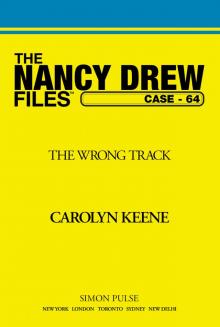 The Wrong Track
The Wrong Track Lights! Camera! Clues!
Lights! Camera! Clues!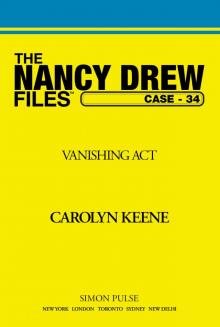 The Vanishing Act
The Vanishing Act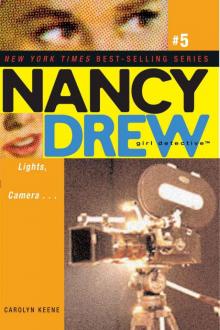 Lights, Camera . . .
Lights, Camera . . . Model Suspect 3
Model Suspect 3 160 The Clue On The Crystal Dove
160 The Clue On The Crystal Dove 163 The Clues Challenge
163 The Clues Challenge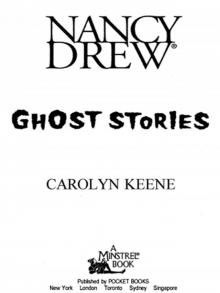 Ghost Stories (Nancy Drew)
Ghost Stories (Nancy Drew)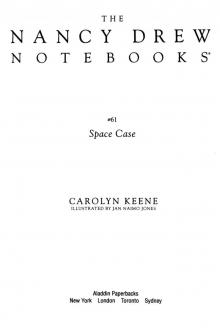 Space Case (Nancy Drew Notebooks Book 61)
Space Case (Nancy Drew Notebooks Book 61) 164 The Mystery Of The Mother Wolf
164 The Mystery Of The Mother Wolf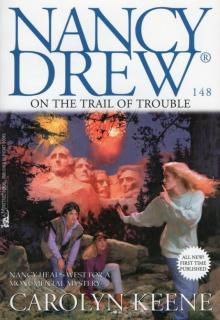 148 On The Trail Of Trouble
148 On The Trail Of Trouble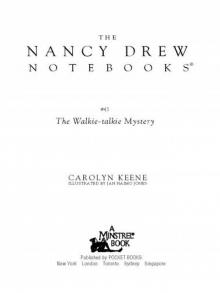 The Walkie-Talkie Mystery
The Walkie-Talkie Mystery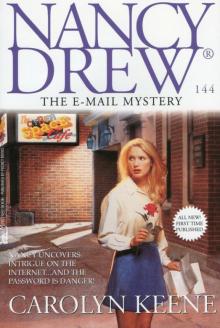 The E-Mail Mystery
The E-Mail Mystery Intruder (Nancy Drew (All New) Girl Detective)
Intruder (Nancy Drew (All New) Girl Detective)![The Stolen Relic [Nancy Drew Girl Detective 007] Read online](http://i1.bookreadfree.com/i2/04/11/the_stolen_relic_nancy_drew_girl_detective_007_preview.jpg) The Stolen Relic [Nancy Drew Girl Detective 007]
The Stolen Relic [Nancy Drew Girl Detective 007]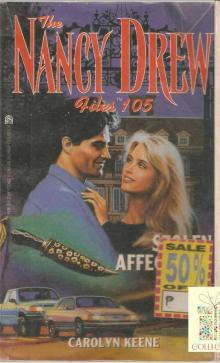 105 Stolen Affections
105 Stolen Affections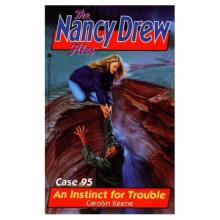 An Instict for Trouble
An Instict for Trouble 161 Lost In The Everglades
161 Lost In The Everglades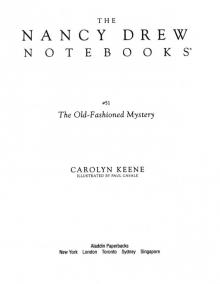 The Old-Fashioned Mystery
The Old-Fashioned Mystery Perfect Plot
Perfect Plot